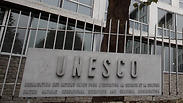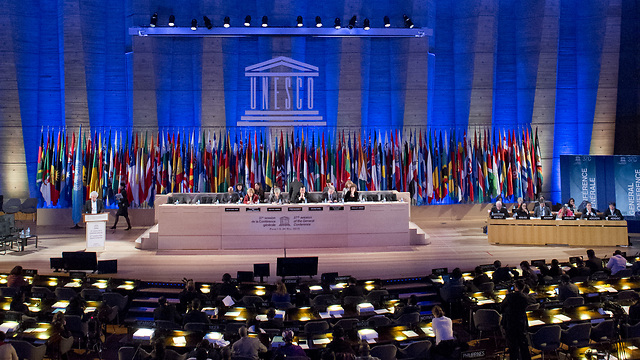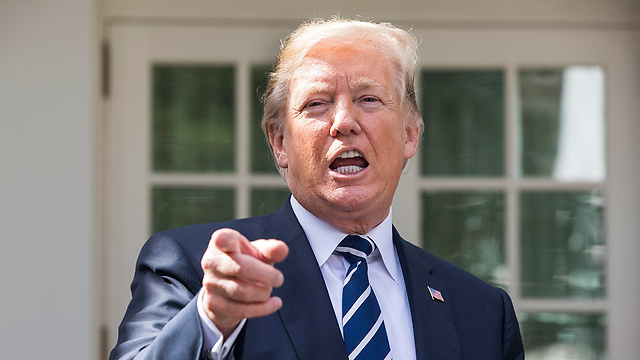
UNESCO. An apparent trend of withdrawing from previous outrageous resolutions
Photo: AP

Israel has no intention of quitting UNESCO, so why threaten?
Op-ed: Israel has never withdrawn from an international organization, regardless of its resolutions. It didn’t pull out or even consider pulling out of the UN following the shameful resolution comparing Zionism to racism. Talking about an Israeli withdrawal is thus foolish, and we only stand to lose from such a move.
Donald Trump is portrayed as a president of many words and little action. Bombastic declarations and minimalist performance. Sometimes, it’s a calming quality. It’s terrifying to imagine what America and the world would look like if President Trump insisted on implementing his statements. He usually avoids keeping his word, and God bless him for that.

Trump’s supporters are defending him by saying that his declarations, his speeches and his tweets are not future lines of action but simply warnings. Trump, they say, is making threats in a bid to make changes and is speeding up those changes through executive orders.
The orders force different arms of the government, the executive authority, to prepare amendments to laws and regulations that would make it possible to implement the order. The road from the moment the order is signed to its actual implementation is long, and considering the nature of the orders—that’s a good thing.

Netanyahu likely understands the risks, which is why he worded his announcement on ‘preparations’ for a possible future withdrawal from UNESCO with great caution (Photo: AP)
In international relations, threatening words obviously have their own dynamic, which may lead to their implementation even if the person making the threats didn’t intend for that to happen. It’s a strategy of walking on the edge, which is recommended as a last resort by game theory experts. Walking on the edge requires strict risk management, an understanding of the other side and a willingness to pull back when the edge is already threatening to throw you from its thin line.
Do Trump’s recent announcements—about the United States’ withdrawal from UNESCO and about his decision to decertify the nuclear agreement with Iran point to a significant change in his approach, from all talk to all action? Not necessarily.
The actual exit from UNESCO has been postponed till the end of next year, and until then it will remain a threat hovering in the air. The same applies to a one-sided cancellation of the nuclear agreement with Iran: It will only happen when President Trump reaches the conclusion that he is unsatisfied with the rectification of the faults in the existing agreement. Will that happen in a year from now? Who knows. Trump’s Iran speech included no times or dates.
This does not downplay the importance of his declarations as a means of pressure. In UNESCO’s case, the pressure possibly led to the election of French Jew Audrey Azoulay as the organization’s new director-general.
We should remember, however, that the US stopped funding UNESCO in 2012, during the Barack Obama era. In practical terms, it was a much heavier blow than the planned American withdrawal. Nevertheless, the funding cuts did not lead to a de-politicization of the organization. On the contrary, its dependence on donations from Arab states only grew. The organization’s outgoing director-general wasn’t anti-Israel either, but her personality didn’t make much of difference. The hands of the organization’s leaders are tied in light of the automatic majority that supports Arab and Palestinian resolutions.
Now, with the combined impact of the financial shortage, the American threats, the Israeli diplomacy and the cracks in the Arab bloc itself, there seems to be a trend in UNESCO of withdrawing from the previous outrageous resolutions—not cancelling them altogether yet, but avoiding their reaffirmation like in previous years. It’s also worth mentioning that the US already pulled out of UNESCO in 1984 under President Ronald Reagan and returned 18 years later.
Israel, however, has never pulled out of an international organization, regardless of its resolutions. It didn’t quit or even consider quitting the United Nations when the General Assembly adopted the shameful resolution comparing Zionism to racism. In general, Israel’s non-political relations with UNESCO are quite good. Need I mention the decision to proclaim Tel Aviv’s White City as a World Cultural Heritage Site?
The talk about an Israeli withdrawal from UNESCO is thus complete foolishness, and Israel only stands to lose from such a move. Prime Minister Benjamin Netanyahu likely understands the risks, which is why he worded his announcement on “preparations” for a possible withdrawal in the future with great caution, just like he worded his declaration of support for Trump’s new strategy against Iran.
Official Israel isn’t keen on nixing the nuclear deal and prefers to see amendments being made to the agreement. All the more so in the UNESCO case: After all, we’re not going to withdraw from the organization, so we shouldn’t be threatening to do so.
















